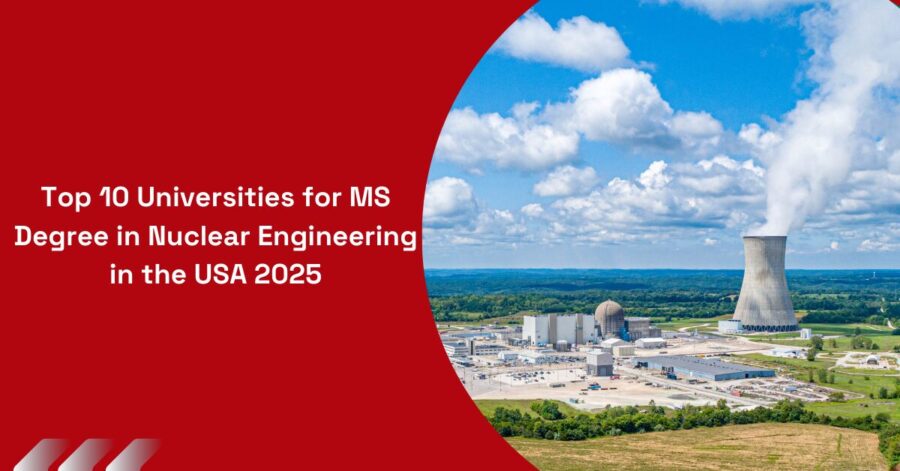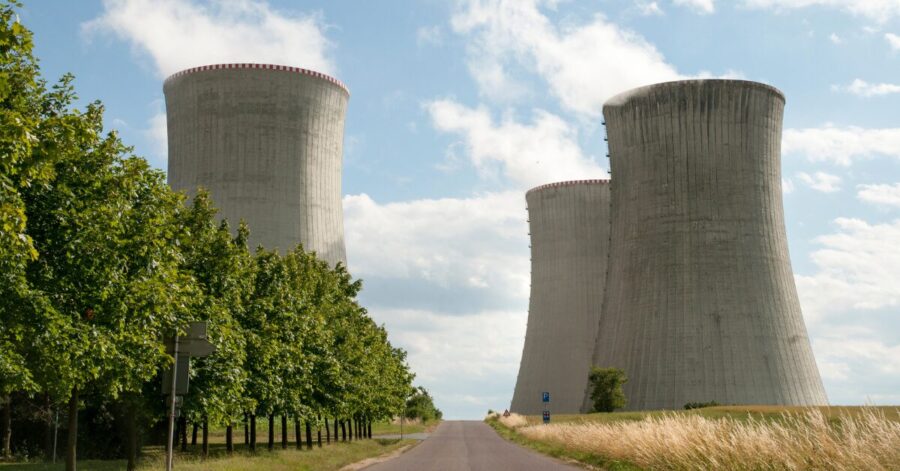17 December 2024
6 minutes read
Top 10 Universities for MS Degree in Nuclear Engineering in the USA 2025

Key Takeaways:
- The USA leads in nuclear technology with top universities offering advanced MS programs in Nuclear Engineering, providing excellent research opportunities and career prospects.
- Graduates from these programs benefit from high salaries and diverse job opportunities across energy, healthcare, and research sectors.
- Working with an expert consultant like Ambitio can help streamline the admission process and improve your chances of success in studying in the US.
Do you know that the USA leads the world in nuclear technology with over 90 nuclear reactors in operation today, more than any other country? Such supremacy is also extended to academics as American universities take a top position in the provision of nuclear engineering courses and facilities for research in top-class institutions such as NASA and the Department of Energy.
For students who aim to create the future of sustainable energy, safety protocols, or even advanced medical treatments with nuclear technology, choosing the right university is of prime importance.
But which one should you start with? This guide explores the top 10 universities for an MS in Nuclear Engineering in the USA in 2025 to help you make the right decision to power your academic and professional journey.
Why Study Nuclear Engineering in the USA?
Work towards the future of energy – study an MS in Nuclear Engineering in the USA and benefit from top university rankings, advanced labs, and being part of essential clean power and safety research, so you can change things with tangible action.

Here are a few key reasons why study nuclear engineering in the USA:
- Top-Ranked Universities: The best universities in the world offering nuclear engineering degree programs can be found in the USA, such as MIT, Stanford, and UC Berkeley.
- Cutting-Edge Research: The best opportunities for cutting-edge research exist in nuclear technology, nuclear reactors, energy production, and medical applications.
- Diverse Career Opportunities: Graduates can intern and work at nuclear power plants, in leading companies like GE, Westinghouse, and the Department of Energy, and various national laboratories, healthcare, defense, and research institutions, including both in the USA and globally.
- Innovation in Energy Solutions: Nuclear engineers contribute to the development of safer, cleaner, and more efficient nuclear energy solutions to address global energy challenges.
- High Salaries and Job Stability: In the United States, nuclear engineers generally command high salaries, as well as enjoy a relatively stable job environment due to the uniqueness of their skills.
Top 10 Universities for MS Degree in Nuclear Engineering in the USA
Do you know? In the United States, you would find some of the greatest science and engineering institutions globally. Thousands of students move into the country to gain their master’s degree in Nuclear Engineering each year. Such opportunities bring both quality education and rewarding careers in the U.S.

Here are the top 10 Universities Offering MS in Nuclear Engineering in USA:
| University | Average Tuition Fees (per year) | Average Starting Salary | Exams Required |
|---|---|---|---|
| Massachusetts Institute of Technology (MIT) | $57,590 | $95,000 | GRE, TOEFL/IELTS |
| University of Michigan, Ann Arbor | $53,200 | $90,000 | GRE, TOEFL/IELTS |
| University of California, Berkeley | $29,000 (in-state) / $44,000 (out-of-state) | $92,000 | GRE, TOEFL/IELTS |
| Georgia Institute of Technology | $29,000 (in-state) / $39,000 (out-of-state) | $88,000 | GRE, TOEFL/IELTS |
| North Carolina State University | $24,000 (in-state) / $51,000 (out-of-state) | $85,000 | GRE, TOEFL/IELTS |
| University of Wisconsin-Madison | $25,500 (in-state) / $51,000 (out-of-state) | $87,000 | GRE, TOEFL/IELTS |
| Texas A&M University | $10,000 (in-state) / $25,000 (out-of-state) | $84,000 | GRE, TOEFL/IELTS |
| Pennsylvania State University | $24,000 (in-state) / $40,000 (out-of-state) | $86,000 | GRE, TOEFL/IELTS |
| University of Illinois Urbana-Champaign | $24,000 (in-state) / $36,000 (out-of-state) | $88,000 | GRE, TOEFL/IELTS |
| Purdue University | $10,000 (in-state) / $30,000 (out-of-state) | $87,000 | GRE, TOEFL/IELTS |
What is the Admission Process for the Master in Nuclear Engineering Programme in the USA for 2025
Applying for a master of science degree in Nuclear Engineering in the US requires a number of critical steps, from researching available programs to securing your visa. A basic knowledge of study and research in a relevant engineering field, and an awareness of the detailed processes involved in it can make your process go smoother and more organized.

So here is a concise step-by-step guide that may help you navigate admission in 2025.
| Step | Description |
|---|---|
| 1. Research Programs | Identify universities offering Nuclear Engineering and check their specific requirements. |
| 2. Meet Eligibility Criteria | Hold a relevant undergraduate degree (e.g., Engineering or Physics) with a competitive GPA. |
| 3. Take Required Tests | Complete GRE (if required), and English proficiency tests like TOEFL or IELTS. |
| 4. Prepare Application Materials | Collect official transcripts, letters of recommendation, a statement of purpose (SOP), and an updated resume/CV. |
| 5. Submit Online Applications | Apply through the university’s portal, ensuring all documents are uploaded before deadlines. |
| 6. Pay Application Fees | Pay non-refundable application fees (typically $75–$150 per university). |
| 7. Attend Interviews (if applicable) | Some programs may require interviews as part of the selection process. |
| 8. Await Admission Decisions | Universities review applications and notify candidates within 2–4 months. |
| 9. Apply for Visa | Once admitted, secure an I-20 form and apply for an F-1 student visa. |
| 10. Plan for Arrival | Arrange for housing, flights, and orientation at the university before the semester starts. |
6 Expert Tips to Get Admission for MS in Nuclear Engineering in the USA
Securing admission for an MS in Nuclear Engineering in the USA is indeed competitive, but with a proper approach, you stand a good chance. While choosing the best universities to apply to and preparing yourself for standardized tests, even the smallest details count: from crafting a compelling application essay to exploring scholarships for international students that can ease a lot of financial burdens.
Here are 6 expert tips to guide you through the entire process and make your dream come true.
Choose Right Universities
Research programs with regard to faculty expertise, research facilities, and industry connections. Tailor applications to best fit each university’s strengths and explore international student scholarships.
Strengthen Your Academic Profile
Maintain a competitive GPA of 3.0 or higher, and focus on courses relevant to nuclear engineering, physics, and mathematics. Show relevant projects and lab experience to have the greatest opportunities to study in the US.
Ace Standardized Tests
Prepare well for the GRE since a good score can differentiate you from the rest. Non-native speakers of English must score very high in TOEFL or IELTS as these scores are sometimes required to gain entry into the US.
Prepare a Good SOP
Present your career objectives, research interests, and what makes you excited about nuclear engineering. Your SOP must reflect each program’s features and state any scholarship needs.
Get Strong Letters of Recommendation
Seek recommendation letters from professors or employers who are well-acquainted with your academic and technical strengths. A letter with specific, personal recommendations has more weight, especially scholarships for international students.
Connect with the Best Study Abroad Consultant
The admission process can seem pretty overwhelming, but speaking with a reliable study abroad consultant could help one get appropriate advice. Ambitio stands as the best consultant to any student who wants to seek admission in the US because of its specialized advice on university selection, applications, scholarships, enhancing English proficiency and navigating visa processes.
Conclusion
Pursuing an MS in Nuclear Engineering in the USA is a huge decision that can be the shape of your career and future. It is not just world-class education but an opportunity to be part of the most revolutionary advancements of energy and technology. Thus, careful planning in choosing universities, preparing for tests, and making a solid application is all part of the journey. But beyond the technical aspect, it is about aligning your goals with a program that can really help you grow. At the end of the day, it’s not about the degree but how you use the opportunities that come with it. And if you do this process with clarity and focus, the rewards are immense.
FAQs
What will I learn in this master’s program?
Get ready to dive deep into how nuclear reactors work, explore materials at the atomic level, understand how to stay safe around radiation, and follow the journey of nuclear fuel from beginning to end.
Do I get to do hands-on stuff in the program?
Absolutely, you’ll get your hands dirty with real-life projects, and lab experiments, and possibly even team up with industries to see how the real world ticks.
What kind of work can I do after I graduate?
You can land cool jobs in energy firms, government, healthcare, research labs, and more, doing everything from engineering to consulting to research.
Is nuclear engineering a growing field?
Yep, it’s on the rise! The push for clean energy, advancements in medicine, and cutting-edge research keeps nuclear engineering buzzing with opportunities.
How big of a deal are safety and ethics in this field?
Huge! You’ll learn not just the how-tos but also the must-dos to ensure the safety of people and the planet.
Can I focus on what interests me most in the program?
Sure thing! Many programs offer tracks in things like designing reactors, studying materials, working on medical uses, or shaping policy, letting you pick your passion.
What do I need to get into the program?
You’ll need a background in engineering or something similar, with a good grip on physics and math.
How does this degree help with green energy?
By focusing on making energy production efficient and clean, nuclear engineering is all about coming up with smart energy solutions for tomorrow.

You can study at top universities worldwide!
Get expert tips and tricks to get into top universities with a free expert session.
Book Your Free 30-Minute Session Now! Book a call now




























